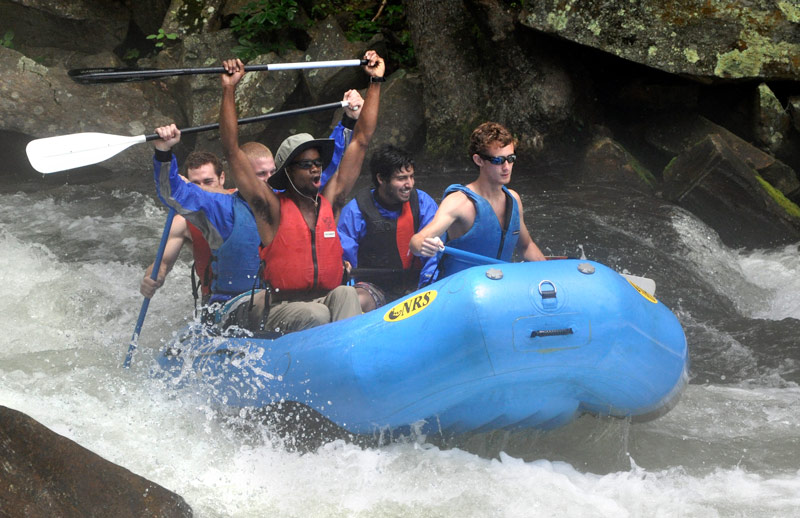- Academic Programs & Support
- Departments, Schools & Colleges
- College of Education and Allied Professions
- Human Services Department
- Parks and Recreation Management (PRM) Program
Parks and Recreation Management (PRM) Program
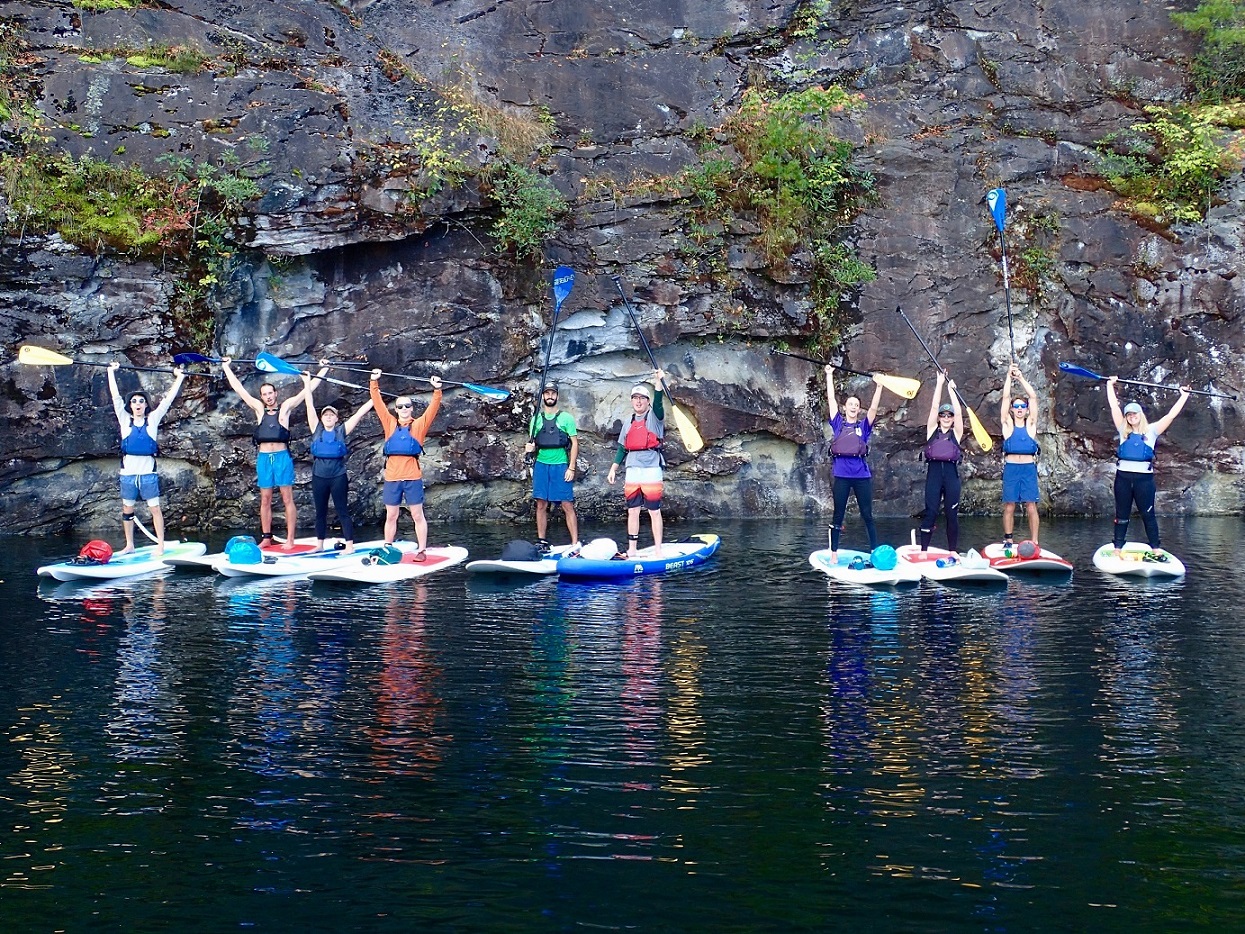
WCU's Parks and Recreation Management (PRM) Program prepares students for professions in the leisure service, recreation, outdoor, and tourism industries, as well as with land agencies such as the National Parks and U.S. Forest Service. Students in the program earn a Bachelor of Science (B.S.) degree in Parks and Recreation Management. A PRM minor is also available.
While there are no formal requirements for admission to the PRM program, students must earn a 2.5 GPA in order to graduate with the PRM degree. As a major in the PRM program, students will work with a PRM faculty advisor to outline courses, certifications, and professional development options to help them achieve their academic and career goals.
PRM & COAPRT Student Learning Objectives
7.01 Students graduating from the program shall demonstrate the following entry-level knowledge: a) the nature and scope of the relevant park, recreation, tourism or related professions and their associated industries; b) techniques and processes used by professionals and workers in these industries; and c) the foundation of the profession in history, science and philosophy.
7.02 Students graduating from the program shall be able to demonstrate the ability to design, implement, and evaluate services that facilitate targeted human experiences and that embrace personal and cultural dimensions of diversity.
7.03 Students graduating from the program shall be able to demonstrate entry-level knowledge about operations and strategic management/administration in parks, recreation, tourism and/or related professions.
7.04 Students graduating from the program shall demonstrate, through a comprehensive internship of not less than 400 clock hours and no fewer than 10 weeks, the potential to succeed as professionals at supervisory or higher levels in park, recreation, tourism, or related organizations.
The B.S. in Parks and Recreation Management (PRM) gives students the broad knowledge that parks and recreation professionals need wherever they choose to work in the profession. This includes employment in outdoor leadership, city and county recreation, military recreation, resorts, tourist attractions, camps, leisure services, or the land agencies (Parks, Forest Service, Army Corps, etc.) among many others. Students will also focus their course work on an area that fits the field of specialization of most interest to them, Community Recreation, Outdoor Leadership and Instruction, Commercial and Resort Recreation, or Recreation Resource Management (for the Parks, Forest Service, Army Corps etc.).
Download the Eight Semester Plan for B.S. in Parks and Recreation Management
As a PRM major, you will earn certifications, complete meaningful projects, present research, obtain experiences, and participate in conferences. It is important to save and document each of these items to be used as you begin your career search. In PRM 370: Professional Planning in PRM, students will begin the process of developing their professional portfolio utilizing the online platform, Linked In. The final opportunity to update the portfolio and Linked In profile will be in PRM 483/484 Capstone Internship.
The portfolio may contain the following items depending upon your focus area in PRM:
- Resume (professional)
- Outdoor Resume (skills, expeditions, experiences)
- Program proposal
- Trip planning documents
- Research prospectus
- Business plan
- Risk management plan and/or analysis
- Leadership self-analysis
- Activity Log/Journal
- Lesson plan or activity proposal
- Tent Peg article
- Newspaper articles, blog posts, press releases
- Service learning or volunteer work
- Photographs of interpretive work or programs
- Certifications related to your career path
- Awards
The minor in Parks and Recreation Management requires 18 hours consisting of two core courses and any 12 hours of electives approved by your PRM advisor. The two core courses are PRM 250 and PRM 270. Please contanct Dr. Callie Schultz at csschultz@wcu.edu for more information.Portfolio
The field of parks and recreation offers graduates a wide range of career options in community recreation, outdoor leadership and instruction, commercial and resort recreation, and recreation resource management.
Learn More About Career Options
We encourage you to gain experience in your chosen area through coursework, internships, and summer employment. You’ll gain leadership and participatory experience through volunteer work at Base Camp Cullowhee, where a range of activities are planned for the on- and off-campus community.
Excellent internship opportunities, including the Great Smoky Mountains National Park, the Blue Ridge Parkway, Navitat, Nantahala Outdoor Center, Project SOAR, and several camps, surround the WCU campus. The strongest industry in the region is tourism, so our students enjoy internships at attractions and resorts in Western North Carolina and in the coastal areas of both North and South Carolina at places like Wilmington, Hilton Head Island, Myrtle Beach, and Charleston. Community parks and recreation agencies also abound in the region.
PRM Program Diversity Statement
Diversity involves the affirmation, understanding, and professional application of the richness
of human differences, ideas, practices, and beliefs that result from, but are not
limited to, age, race, color, disability/health, ethnicity, gender identity, language,
national origin, religion/spirituality, sexual orientation, socioeconomic status,
rural or urban status, as well as the intersectionality of these multiple identities.
Professional practice that is responsive to diversity includes culturally appropriate communication skills; understanding power differentials and
dynamics; and attending to the social and cultural values which influence the multiple
areas of practice represented in PRM.
PRM Program Commitment to Social Justice
A commitment to social justice serves as a guiding principle of the PRM Program and
reflects our belief in the values and goals of a socially just society. Socially
just societies are dependent upon the optimal functioning, health, and well-being
of all persons in that society. Optimal functioning, health, and well-being of persons are contingent upon access
to healthy environments that support healthy development and functioning. Our program
is centered on a social justice approach by helping students to examine power structures
resulting in social injustices and to adopt an advocacy role in working with marginalized
and underserved populations. Our goal is to foster the development of professional
advocates who work to change societal structures, practices, values, and policies
which have long served to perpetuate unhealthy environments for these populations.
By working to effect change at the individual, institutional and systemic level,
our students assist in promoting greater access to economic, social, political, and
cultural resources.
PRM Partnership with the Social Justice Minor
PRM 275: Diversity & Inclusion is a core course in the PRM program and the Social Justice Minor. For more information about the minor, visit sj.wcu.edu.
You may be able to study abroad for around the same cost as studying at Western. We have a special agreement with the Atlantic Technological University in Ireland and have had international exchanges for a few years now. Studying in Ireland would require a year commitment and is best done early. Study abroad is a great experience! Ask for further details.
The PRM Club is part of SGA at WCU and receives funding to help with club expenses.
Being a member of the club enables you to get to know other PRM students who, besides
helping you to make friends on campus, broaden your network of professional contacts
for when you have graduated.
Read more about the PRM Club.
PRM Mission
Our mission is to advance knowledge, educate professionals, engage communities, and affect positive social and environmental change using innovative, experiential, and equitable practices. PRM graduates are prepared to design, implement, and evaluate components of the leisure service industry.
PRM Vision
We envision a global community where individuals and groups can equitably and responsibly access spaces for recreation, pursue healthy active lifestyles, and promote social and environmental justice.
PRM ValuesDiversity & Social Justice |
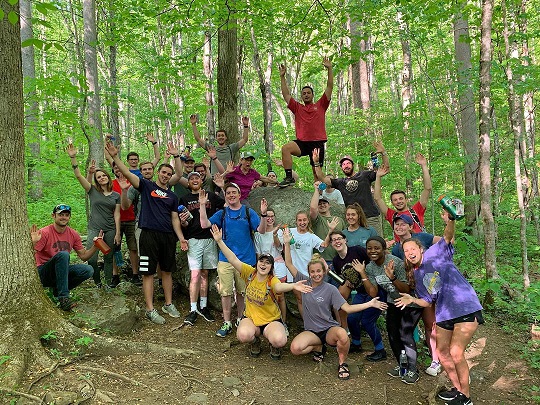 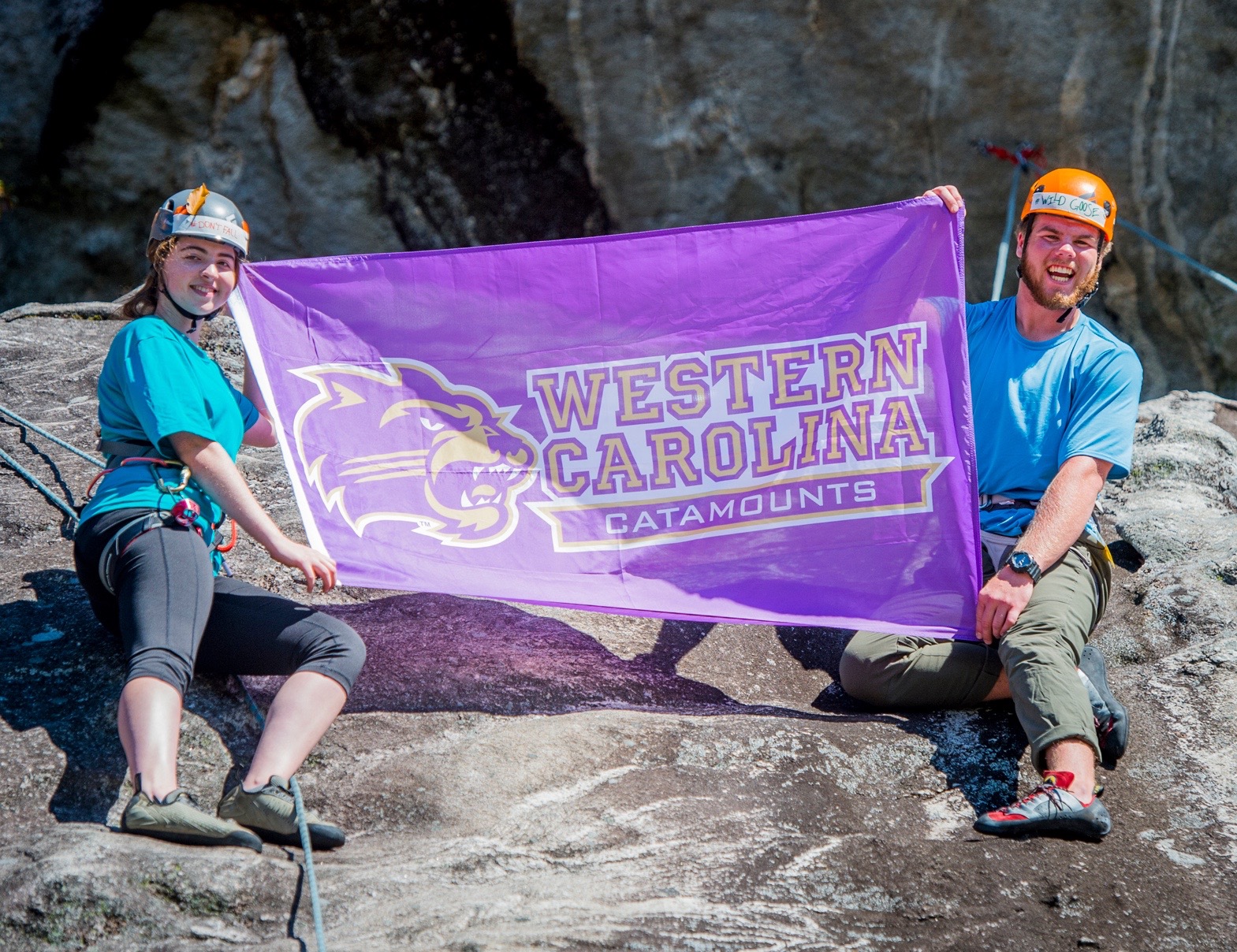 |
PRM Faculty
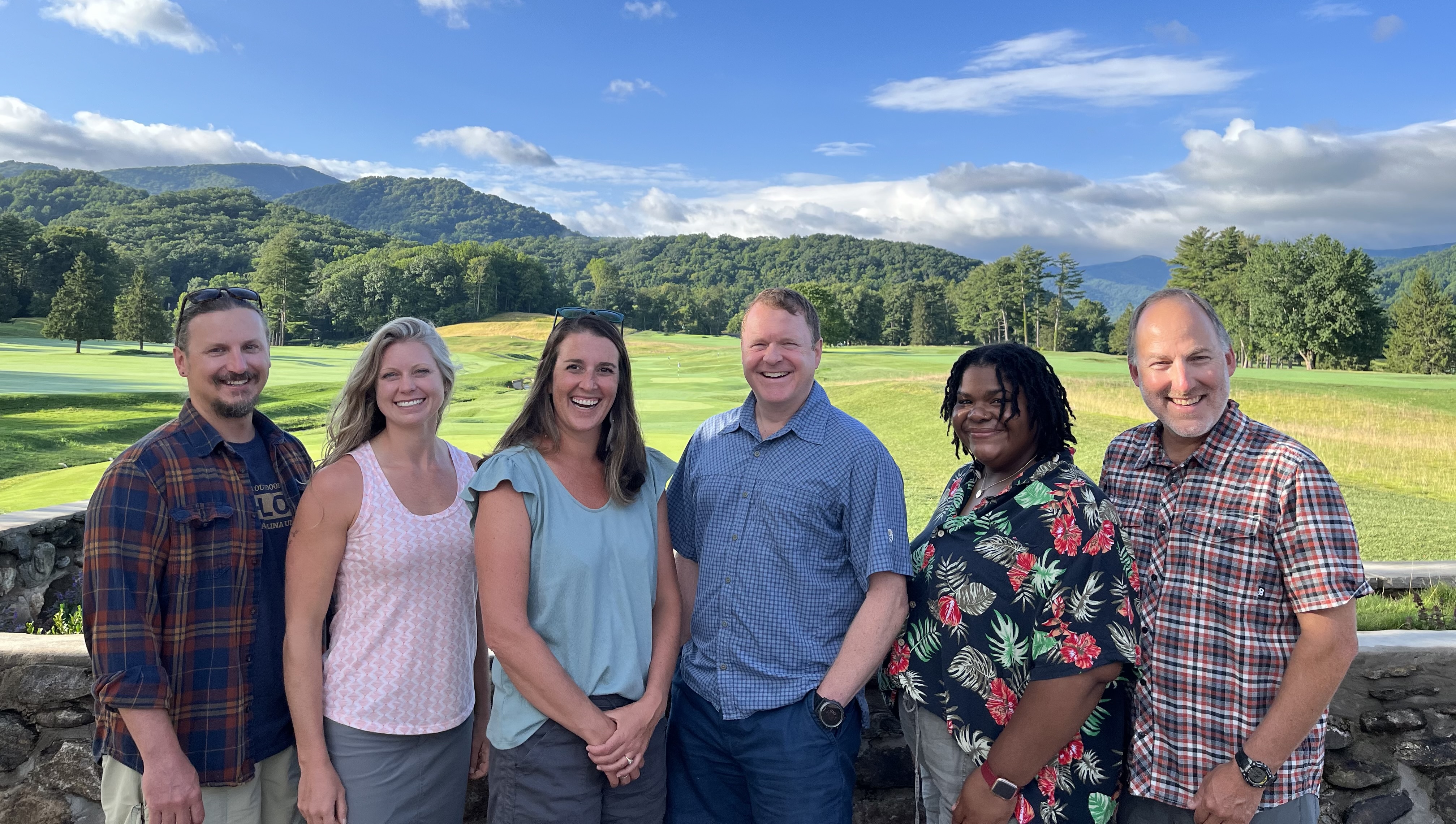
Left to right: Jeremy Schultz, Rebekah Henderson, Callie Schultz, Paul Stonehouse, Roslynn Powell, Andrew Bobilya
Paul Stonehouse
Assistant Professor
Parks and Recreation Management and Experiential and Outdoor Education
Adjunct Instructors:
Jeremiah Haas, Associate Director of Outdoor Programs - jhaas@wcu.edu
Todd Murdock, tmurdock@wcu.edu
Tanya Poole, tbpoole@wcu.edu
Dr. Ben Tholkes, Professor Emeritus - tholkes@wcu.edu
David Wynn, wynnd@wcu.edu
Accreditation
Western Carolina University’s Parks and Recreation Management program is accredited by the Council on Accreditation of Parks, Recreation, Tourism and Related Professions (COAPRT). The Council on Accreditation of Parks, Recreation, Tourism and Related Professions (COAPRT) accredits baccalaureate programs in parks, recreation, tourism, sport management, event management, therapeutic recreation, and leisure studies offered at regionally accredited institutions within the United States and its territories, and at nationally accredited institutions in Canada, and Mexico.
Important Information Regarding Degree Mills:
Please watch this important video regarding degree and accreditation mills. According to CHEA, "Degree mills and accreditation mills mislead and harm. In the United States, degrees and certificates from mills may not be acknowledged by other institutions when students seek to transfer or go to graduate school. Employers may not acknowledge degrees and certificates from degree mills when providing tuition assistance for continuing education. “Accreditation” from an accreditation mill can mislead students and the public about the quality of an institution. In the presence of degree mills and accreditation mills, students may spend a good deal of money and receive neither an education nor a usable credential." Read more on CHEA's website: https://www.chea.org/important-questions-about-degree-mills.
Annual COAPRT Assessment Updates
PRM's 2021-2022 Continuous Improvement Report (CIR)
Fall 2021 | 7.0 Series COAPRT Data
Spring 2022 | 7.0 Series COAPRT Data
PRM's 2022-2023 Continuous Improvement Report (CIR)
Fall 2022 | 7.0 Series COAPRT Data
Spring 2023 | 7.0 Series COAPRT Data
Summer 2023 COAPRT Accreditation Assessment Report
2020 Self-Study Report
Current faculty CVs are linked in individual faculty webpages (above) and in self-study document.
2.01:02
b. PRM Program Development Plan (2015-2016)
c. PRM Program Review Report 2016
2.03
a. WCU Curriculum Process Provost Guidelines
2.05:01 & 2.05:04
a. PRM Continuous Improvement Report 2019-2020
b. PRM Continuous Improvement Report 2017-2018
c. PRM Assessment Plan 2016-2017
d. PRM Assessment Improvement Plan Status Report 2020
2.05:02
a. Provost Guidelines for Tenure, Promotion, Retention
b. Department of Human Services Department Collegial Reveiw Document
2.05:03
a. PRM COAPRT Standards Measured by Assessment tool, method, and year
b. PRM Curriculum Map-Intro, practice, mastery
c. PRM Curriculum Map-Program SLOs to Course SLOs
2.05:05
a. Fall 2019 COAPRT Assessment Report
b. Spring 2019 COAPRT Assessment Report
c. Spring 2020 COAPRT Assessment Report
3.01:01 & 3.03
3.01:03 & 3.01:04
a. Department of Human Services Collegial Review Document (DCRD)
3.04
a. PRM Retreat Agenda Fall 2020
b. PRM Faculty Meeting Agenda 10.20.20
c. PRM Retreat Minutes Fall 2019
d. PRM Faculty Meeting Minutes 9.3.19
3.05
b. Advisory Board Meeting Agenda Fall 2020
Current faculty CVs are linked in individual faculty webpages (above) and in self-study document.
5.01
a. PRM Senior Exit Survey Results 2017
b. PRM Senior Exit Survey Results Spring 2018
c. PRM Senior Exit Survey Results Fall 2018
d. PRM Senior Exit Survey Results 2019
5.03:01
f. PRM Transfer Student 4-Semester Plan
5.03:02
c. Professional Portfolio using Linked In Assignment (intro-260)
7.0 Series Overivew:
a. Program SLO to Course SLO Map
b. Curriculum map (intro, practice, mastery)
7.0 Series Sample Syllabi, Assignments, and Rubrics:
a. PRM 250: Foundations of Parks and Recreation Management
i. Syllabus
b. PRM 260: Professional Planning in PRM
i. Syllabus
ii. Synthesis Paper Assignment
c. PRM 270 : Leadership & Group Dynamics
i. Syllabus
iii. Group Project Presentation & Rubric
d. PRM 495: Senior Seminar
i. Syllabus
ii. Assignment booklet (includes all assignments and rubrics)
e. PRM 255: Active Recreation & Leisure
i. Syllabus
ii. Student-led Activity Sessions Assignment & Rubric
f. PRM 430: Entrepreneurship & Commercial Recreation
i. Syllabus
ii. Feasibility Study Assignment & Rubric
g. PRM 275: Diversity & Inclusion in PRM
i. Syllabus
ii. Course Calendar
iii. "Self-as-other" Paper Rubric
v. Reading response assignment
h. PRM 461: Management & Administration of PRM
i. Syllabus
ii. Recreation project assignment and rubric
i. PRM 361: Program Planning & Evaluation of PRM
i. Syllabus
iii. Oral Presentation Assignment
iv. Evaluation Report Assignment
j. PRM 483/484: Capstone Internship I & II
i. Syllabus, Reflection Paper Assignment and Rubric
k. PRM 370: Capstone Internship Orientation
i. Syllabus

